The Swansea City Story
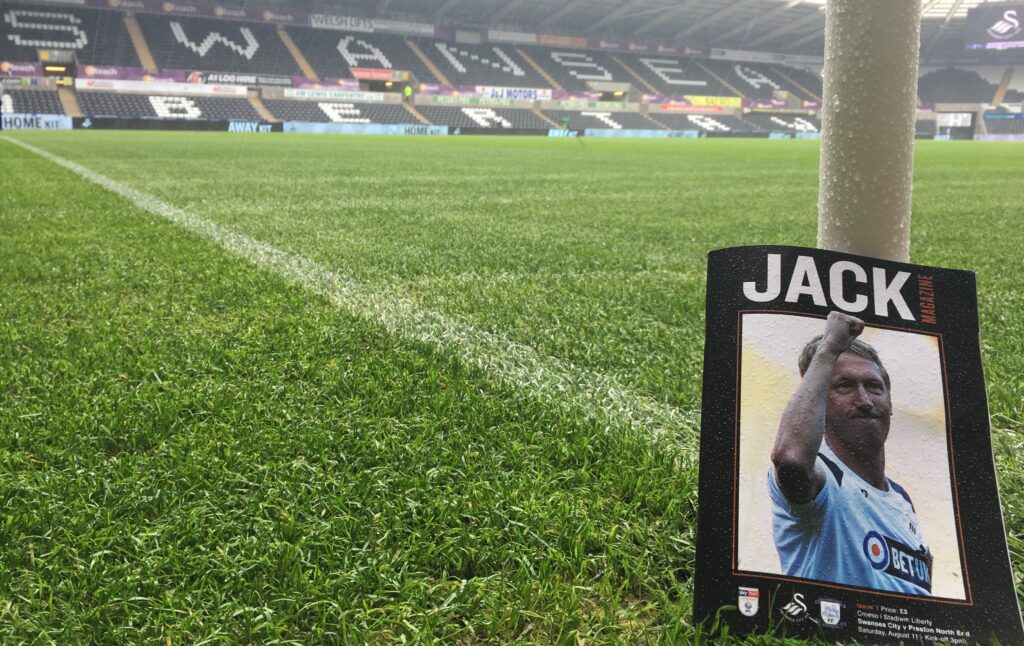
SWANSEA CITY are a Welsh professional football team who have achieved the highest of highs, but also the lowest of lows, reaching the pinnacle of the English league system and yet coming close to exiting the Football League altogether.
John Toshack, who went on to manage Wales, was Swansea City’s most successful manager with three league promotions and three Welsh Cup wins. He led the club to their highest league finish, sixth place in the 1981–82 First Division. However, their dramatic rise up through the divisions was followed by an equally dramatic decline.
The club’s climb from the Fourth Division of English football to the top division is chronicled in the 2014 documentary film Jack to a King – The Swansea City Story.
In 2011, Swansea achieved promotion to the Premier League under Brendan Rodgers, becoming the first Welsh team to play in the top flight since its formation in 1992. During Swansea City’s centenary year (2012–13), the club won the League Cup for the first time under Michael Laudrup, the first major trophy in Swansea’s 100-year history.
There have been almost 50 permanent managers, since the appointment of the club’s first professional manager, Walter Whittaker in 1912.
The Swans have played their home matches at the Liberty Stadium since 2005, having previously played at the Vetch Field since the club was founded.
Wilfred Milne holds the record for Swansea appearances, having played 586 matches between 1920 and 1937, closely followed by Roger Freestone with 563 between 1991 and 2004. The player who has won the most international caps while at the club is Ashley Williams with 50 for Wales.
The goal-scoring record is held by Ivor Allchurch, with 166 goals, scored between 1947 and 1958 and between 1965 and 1968. Cyril Pearce holds the records for the most goals scored in a season, in 1931–32, with 35 league goals in the Second Division and 40 goals in total.
The club broke their transfer record to re-sign André Ayew from West Ham United in January 2018 for a fee of £18m. The most expensive sale is Gylfi Sigurðsson who joined Everton in August 2017 for a fee believed to be £45m.
The Swansea City Supporters Society Ltd owns 20 per cent of the club, with their involvement hailed by Supporters Direct as “the most high-profile example of the involvement of a supporters’ trust in the direct running of a club”.
The club was founded in 1912 as Swansea Town. The area around Swansea traditionally had been a rugby area, and despite previous attempts by a team named Swansea Villa, there were no notable football clubs until the establishment of ‘Swansea Town AFC’.
Following the lead of many other south Wales sides, the club joined the Second Division of the Southern League and a site owned by Swansea Gaslight Co, called Vetch Field due to the vegetables that grew there, was rented to be the club’s ground.
The club’s first professional match was a 1–1 draw at the Vetch against Cardiff City on September 7, 1912. During that first season they won the Welsh Cup and beat reigning English champions Blackburn Rovers 1–0 in the first round of the 1914–15 FA Cup, Swansea’s goal coming from Ben Beynon.
Following the First World War the Southern League dropped its Second Division, and with many clubs dropping out due to financial difficulties, the Swans were placed in the First Division. After four seasons in the Southern League, Swansea Town became founder members of the new Third Division of The Football League in 1920 and then Division Three (South) the following season.
After five seasons in Division Three (South) and a few failed bids for promotion, the Swans reached the Second Division for the first time in 1925, beating Exeter City 2–1 at home on the final day of the season to win the division. The side had remained unbeaten at home in the league all season – something the next promotion team would emulate over 20 years later.
The following season the Swans reached the semi-finals of the FA Cup for the first time, beating Exeter City, Watford, Blackpool, Stoke City, Millwall and Arsenal, before losing 3–0 to eventual cup winners Bolton Wanderers at White Hart Lane.
During the 1926–27 season they beat Real Madrid 3–0 on tour. During the 1931–32 season they finished first in the league and won the Welsh Cup, beating Wrexham 2–0 away after a replay.
They again won the Third Division South title in 1948–49, having been relegated two years previously. Billy McCandless was the manager who led the side to promotion, and in doing so he completed a rare hat-trick of winning the Third Division (South) title with all three south Wales clubs – and without losing a home game with Swansea or Cardiff.
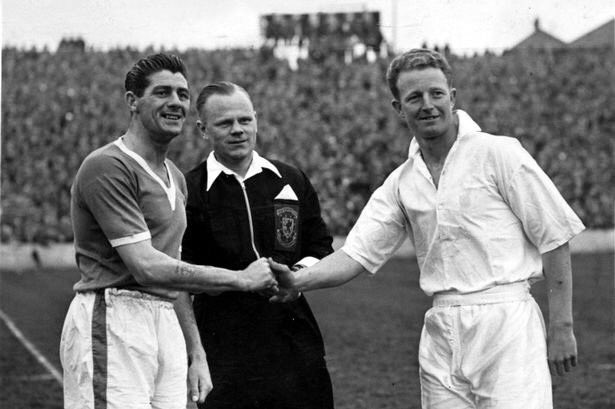
Following promotion, the Swans had another 15 years of Second Division football to look forward to, only once looking like they could genuinely challenge for promotion. That came in the 1955–56 season, when a side containing the likes of Ivor Allchurch, Terry Medwin, Harry Griffiths and Tom Kiley led the table early in the season, before an injury to Kiley, referred to as the linchpin of the side, in mid-November led to a decline in form.
In 1964, the Swans reached a second FA Cup semi-final, beating Barrow, Sheffield United and Stoke City en route to a famous sixth-round victory at Anfield. Few gave the Swans, struggling for their lives at the bottom of Division Two, any chance of causing an upset against league leaders Liverpool. But Swansea were 0–2 up at half-time thanks to Jimmy McLaughlin and Eddie Thomas and held out for a 2-1 win. Fellow second division side Preston North End awaited in the semi-final at Villa Park, but this time the Swans were to be on the wrong end of a 2-1 scoreline.
After flirting with relegation on a few occasions during the previous seasons, the Swans’ luck finally ran out a season later in 1965, and they were back in the Third Division before falling into the Fourth Division two seasons later.
A tragedy struck the club on January 20, 1969, when players Roy Evans and Brian Purcell were killed in a car crash on the way to a game.
The club changed their name to Swansea City in 1969 to reflect Swansea’s new status as a city and Roy Bentley’s side celebrated by securing promotion back to the Third Division.
A record run of 19 matches unbeaten provided the foundations for a promotion challenge in 1971–72, but an awful run towards the end of the season resulted in a mid-table finish. A poor start the following season, combined with falling attendances, saw Bentley resign, and he was replaced by Harry Gregg. Gregg failed to stop the rot and the club was back in the Fourth Division for 1973–74 season.
A record low crowd of just 1,358 watched the Swans against Northampton Town, and the following season the Swans were forced to apply for re-election to the Football League after a last-day defeat at Rochdale condemned them to a 21st-place finish. The application was a success, although by now former player Harry Griffiths had replaced Gregg as manager.
Malcolm Struel also took over as chairman, having previously been on the board, and promised a return to former glories, stating that he would not sell the club’s best young talent as previous boards had done.
Despite promising performances during the first half of the 1977–78 season, Griffiths resigned as Swansea City’s manager in February 1978, doubting his own ability to take the club any further. The new manager was former Liverpool, Cardiff City and Wales striker John Toshack.
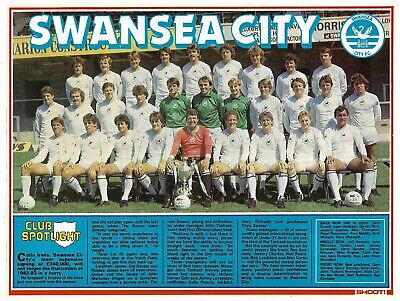
On March 1, 1978, at 28 years-old, Toshack became the youngest manager in the Football League. Thus began a remarkable climb from the Fourth Division to the top of the entire league.
Toshack used his connections with former club Liverpool to make several marquee signings. Anfield veterans Tommy Smith and Ian Callaghan arrived at the Vetch for the start of the 1978-79 season and later Colin Irwin (1981) and Ray Kennedy (1982) would head to west Wales.
Toshack himself came off the bench to score the winning goal against Chesterfield and thus secure a returned to the Second Division after an absence of 14 years.
After a season of consolidation, Swansea City again challenged for promotion and travelled to Preston North End on May 2, 1981, in the knowledge that victory would assure them a place in the First Division for the first time in the club’s history.
A 3–1 win guaranteed a third promotion in four seasons and Swansea City joined the footballing elite. The goalscorers on that historic day at Deepdale were Tommy Craig, Leighton James and Jeremy Charles. The four-year rise from basement to top division is a record in English football, held jointly with Wimbledon. Swansea also won the Welsh Cup that season, qualifying for Europe for the first time since the 1965–66 season.
The 1981–82 season began as implausibly as recent history had suggested it might. The fixture computer handed Swansea’s upstarts a first-day home game against Leeds United, which Swansea promptly won 5–1 with a hat-trick by debutant Bob Latchford.
Swansea had swept from the basement division to the top of the entire Football League in barely three years. Victories over footballing royalty such as Liverpool, Manchester United, Arsenal and Tottenham Hotspur followed as the club topped the league on several further occasions. However, injuries to key players took their toll, and the lack of depth in the squad meant that the season ended in a sixth-place finish.
A fateful combination of poor form, misfortune in the transfer market and financial problems led to a slump which was as quick and spectacular as had been the meteoric rise: two consecutive relegations followed, and Toshack was sacked.
By 1985, the club was battling for its very survival on two fronts. Whilst its creditors lined up a High Court hearing with the aim of liquidating the club, Swansea City had come to rely on a combination of old-stagers and young professionals on the pitch.
Wound up by court order in December 1985, Swansea City was saved by local businessman Doug Sharpe who took over the running of the club, although the change of ownership was not enough to prevent relegation to the Fourth Division in 1986. Eight years on from the first promotion under Toshack, the club was back where it had started.
Swansea won promotion from the Fourth Division in 1988 – beating Rotherham United and Torquay United over two legs in the inaugural play-offs. They remained in the league’s third tier for the next eight seasons – the longest period of stability the club had seen since the 1940s.
Sharpe may have kept the purse strings tight, but under Terry Yorath and then Frank Burrows, the club managed to stay in the Second Division, reach the play-off semi-finals in 1993 and make their first Wembley appearance a year later.
Burrows guided the Swans to the final of the Autoglass Trophy where they played Huddersfield Town in a final that finished 1–1, the Swans winning 3–1 on penalties.
The 1995–96 season ended with relegation back to the third division after eight years, despite the arrival of another ex-Liverpool star in Jan Mølby. However, Dane Mølby was taking his first steps in management, and the Liverpool connection did not cause history to repeat itself.
Alan Cork took over, but was dismissed after leading the club to its lowest league finish for 23 years. John Hollins was appointed, and things finally started to improve. After reaching the promotion play-offs in 1999, the club was promoted in 2000 as Division Three champions. During the season the side set a record of nine consecutive league victories and seven consecutive clean sheets.
In July 2001, following relegation back to the Third Division, the club was sold to managing director Mike Lewis for £1. Lewis subsequently sold on his stake to a consortium of Australian businessmen behind the Brisbane Lions Australian Rules Football team, fronted by Tony Petty. Seven players were sacked and eight others saw their contracts terminated, angering supporters and sanctions were threatened by the Football League with a rival consortium headed by ex-player Mel Nurse seeking to buy out the new owners. During this period Hollins was also sacked and Colin Addison took over as manager.
The turmoil led to the creation of the Swansea City supporters’ trust, which sought to save the club and ultimately guarantee supporter representation on the club’s board.
The Petty group sold its stake in January 2002 after a bitter stand-off with the Nurse consortium, which was supported by the majority of the club’s fans. Jim Moore and Mel Griffin stepped into the breach and persuaded Petty to sell to them (as he had promised to bankrupt the club and make it extinct rather than sell to Nurse).
From there, Moore became chairman for three weeks giving the Nurse consortium time to organize its finances. Having successfully reorganized the finances of Hull City FC, both Moore & Griffin were believers in clubs belonging in the hands of local people, and so subsequently passed the club onto Nurse’s consortium.
Despite distractions off the pitch, Addison’s side had managed a mid-table position, but lack of funds led to his dismissal in early March, and under Nick Cusack the club slumped to a 20th placed-finish. Cusack lasted just eight games into the following season, and was sacked after a 1–0 defeat at league debutants Boston United had put the Swans on the bottom of the Football League for the first time in its 91-year history.
He was replaced by Brian Flynn. Swansea City avoided relegation to the Football Conference on the last day of the season, at the expense of Exeter City, a club then vice-chaired by Mike Lewis.
The managerial merry-go-round continued. Flynn’s side finished 2003–04 10th and reached the fifth round of the FA Cup for the first time in 24 years. Flynn was dismissed and replaced by Kenny Jackett. Jackett lost his first six matches in charge, ending any hope of a play-off place.
The following season Jackett recruited a number of new defensive players and set a record of seven consecutive home clean sheets, all victories. The Swans’ last season at the Vetch Field saw the club win promotion on the last day of the season, clinching a third-placed finish with a 1–0 win away to Bury. Their last league game at their old ground was a 1–0 win over Shrewsbury Town, with the last game of any sort being a 2–1 win against Wrexham in the final of the 2005 FAW Premier Cup.
After 93 years at the Vetch, Swansea moved to the new Liberty Stadium during the summer of 2005. The first competitive game was a 1–0 victory against Tranmere Rovers in August 2005.
In the following season Jackett resigned as manager in mid-season to be replaced by Roberto Martínez. Martínez’s arrival saw an improvement in form, but Swansea missed out on the play-offs again. The following season, an 18-game unbeaten run helped them to the League One title. The club amassed a total of 92 points over the course of the season, the highest ever by a Welsh club in the Football League. Five Swansea players were in the PFA Team of the Year, including the division’s 29-goal top scorer Jason Scotland.
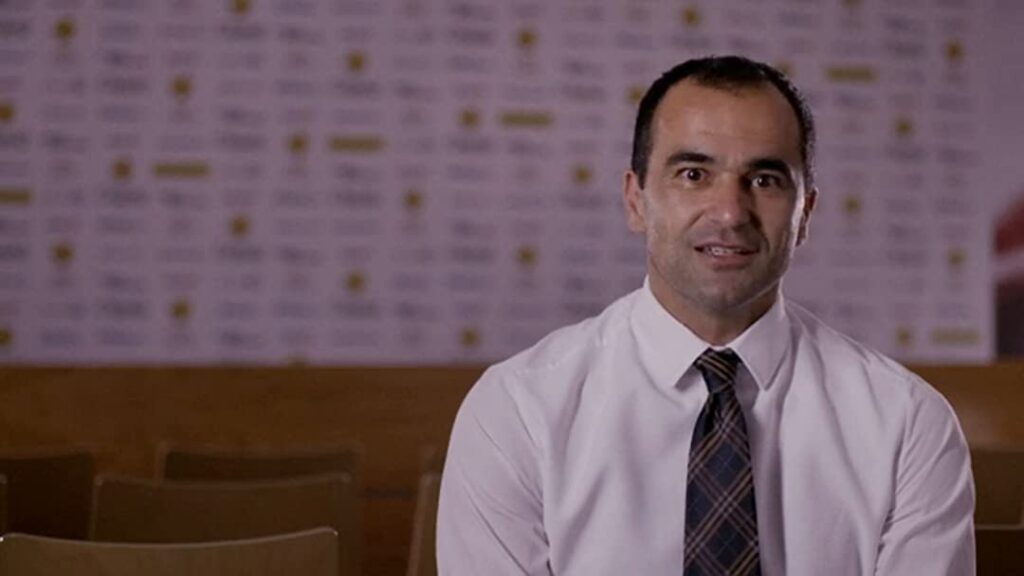
After an impressive 63 wins in 126 games for Swansea City, which saw the manager earn plaudits for the team’s attractive playing style, Martínez left for Wigan Athletic in June 2009. He was replaced by Portuguese Paulo Sousa who adopted a more defensive style of play whilst also retaining the slick and effective continental game of ‘tiki-taka’ football that was installed by his immediate predecessor.
Sousa subsequently left Swansea to take charge at Leicester City, lasting just one year and 13 days in south Wales.
Northern Irishman Brendan Rodgers took charge for the 2010–11 season. He guided the club to a third-placed finish and qualification for the Championship play-offs, with the new manager again keeping the continental style of play introduced by Martínez. After beating Nottingham Forest 3–1 on aggregate in the semi-final they defeated Reading 4–2 in the final at Wembley Stadium, with Scott Sinclair scoring a hat-trick.
By being promoted to the Premier League for the 2011–12 season, Swansea became the first Welsh team to play in the division since its formation in 1992. They signed Danny Graham from Watford for a then-record fee of £3.5m. They defeated Arsenal, Liverpool and Manchester City, the eventual champions, at home during the season as they finished their debut Premier League season in 11th, but at the end of the season Brendan Rodgers left to manage Liverpool.
He was replaced by Michael Laudrup for the 2012–13 Premier League season, which was the club’s centenary season. Laudrup’s first league game ended in a 5-0 victory over Queens Park Rangers away at Loftus Road. Swansea then beat West Ham United 3–0 at the Liberty Stadium, with Michu scoring his third goal in two games. This saw Swansea top of the Premier League; it was the first time since October 1981 the team had been at the summit of the top tier. They would finish in the top half of the table. Michu ended the season as the club’s top scorer in all competitions, with 22 goals.
The club announced a profit of £14.2 million after their first season in the Premier League.
On February 24, 2013, Swansea beat Bradford City 5–0 to win the 2012–13 Football League Cup, lifting the first major trophy in the club’s history. This qualified them for the 2013–14 UEFA Europa League.
Swansea paid a club record transfer fee of £12m to secure the signing of striker Wilfried Bony from Vitesse Arnhem.
Swansea enjoyed initial success in Europe, beating Spanish side Valencia 3–0 at the Mestalla Stadium. On November 3, 2013, Swansea lost the first Welsh derby in the Premier League to Cardiff City following a 1–0 defeat. Three months later, Laudrup was dismissed from the club after a poor run of form. Defender Garry Monk, a Swansea player since 2004, was named as his replacement. In Monk’s first game in charge, Swansea beat Cardiff 3–0 at the Liberty Stadium on February 8, 2014.
Despite holding Rafael Benítez’s Napoli to a 0–0 draw in the first leg of the Europa League Round of 32, Swansea exited the competition after losing 3–1 in the second leg at the Stadio San Paolo.
In January 2015, Bony was sold to Manchester City for a record sale of £25m, eclipsing the record fee received from Liverpool for Joe Allen at £15. At the time of the sale, Bony was the club’s top scorer with 34 goals in all competitions, and the Premier League’s top scorer for the 2014 calendar year, with 20 goals.
Swansea City finished eighth in the Premier League at the end of the 2014–15 season with 56 points, their highest position and points haul for a Premier League season. They recorded league doubles over Arsenal and Manchester United, becoming only the third team in Premier League history to achieve that feat.
On December 9, 2015, manager Monk was sacked after one win in 11 matches. The club, after a period with Alan Curtis as caretaker manager for the third time, chose the Italian former Udinese Calcio coach Francesco Guidolin. Swansea came under new ownership by an American consortium led by Jason Levien and Steven Kaplan, who bought a controlling interest in the club in July 2016. Chairman Huw Jenkins remained at the club.
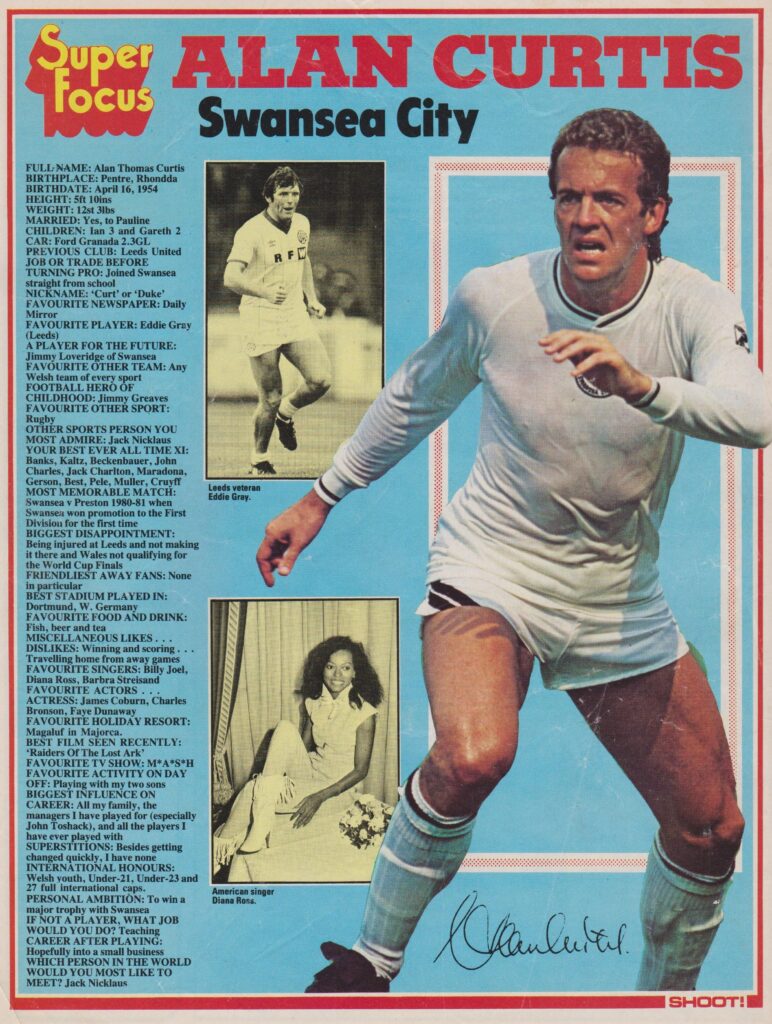
Three months later, Guidolin was sacked and replaced by American coach Bob Bradley. The selection of Bradley marked the first time a Premier League club had ever hired an American manager. Bradley himself was sacked after just 85 days in charge; he won only two of his 11 games, conceded 29 goals, and left with a win percentage of just 18.1%.
At the start of 2017, Bayern Munich assistant manager Paul Clement agreed to take charge of the team, replacing Bradley. During the remainder of the 2016–17 season, Clement led Swansea to win 26 points from 18 games, securing their survival on May 14. Only three prior teams had climbed from bottom of the table at Christmas to escape relegation, and only one prior team was able to escape relegation while having three managers during a season.
A poor first half of the 2017–18 season saw Swansea sitting bottom of the table after 18 league games, which led to Clement being sacked on December 20, 2017, with the club four points adrift of safety. He was replaced by Portuguese manager Carlos Carvalhal. Despite consecutive league home wins against Liverpool (1–0), Arsenal (3–1), Burnley (1–0) and West Ham (4–1), Swansea were winless in their last nine league games (losing five) under Carvalhal, leaving them in 18th place on the final day of the season.
During the season, chairman Jenkins and the club’s American owners were criticised by Swansea fans and pundits for poor transfer windows and the firing of managers; Alan Shearer blamed the Swansea board for moving away from the style of play found under previous managers Rodgers and Martínez.
The club was relegated from the Premier League at the end of the 2017–18 season.
By June, Swansea had another manager, Graham Potter replacing Carvalhal. On February 2, 2019, Jenkins resigned as chairman amid increasing criticism over the club’s sale to the American consortium in 2016 and the subsequent relegation from the Premier League.
Potter left at the end of the season to manage Premier League club Brighton. He was succeeded by former England Under-17 manager Steve Cooper. In September 2019, Cooper was named EFL Championship Manager of The Month, with Swansea City sitting top of the table after an unbeaten first month; this was Swansea’s best start to a season in 41 years. On the final day of the season, Swansea beat Reading 4–1 to finish sixth, moving into the play-offs ahead of Nottingham Forest on goal difference, but were later defeated by Brentford in the semi-final second leg.
At the end of the 2020–21 season, Swansea finished 4th in the league and secured a play-off place for a second consecutive season. Swansea progressed to the 2021 EFL Championship play-off final after defeating Barnsley 2–1 on aggregate, but lost to Brentford at Wembley Stadium.
Since then, under Cooper, Russell Martin, Michael Duff, Luke Williams and Alan Sheehan, the Swans have enjoyed the relative comfort of mid-table finishes in the Championship.
BACK TO HOME PAGE
